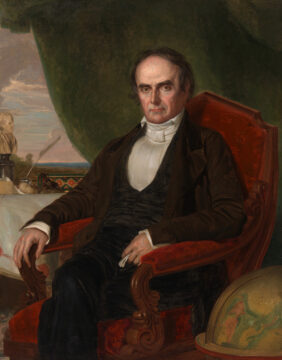by Michael Liss
We are now on opposite sides of the moral universe. —Joseph Buckingham, journalist and Massachusetts State Senator, speaking of his once esteemed friend, Daniel Webster.

What a wonderful quote. Thirty years of amicable relations destroyed in the course of a three-hour speech. March 7, 1850. Senator Daniel Webster taking his leave of old friends and older ideals as he seeks the higher ground of political peacemaking.
Webster’s story is one of eight Senators’ featured in John F. Kennedy’s 1956 Pulitzer Prize winning book Profiles In Courage. This is as good a time as any to acknowledge what everyone knows: The book is the story of political integrity, but JFK really didn’t author most of it. The bulk of the research and writing was done by his long-time speechwriter Theodore Sorensen. Let’s also acknowledge that JFK’s dad, Joseph P. Kennedy, might have “assisted” in nailing down the prestigious award.
Such is politics, and such is the process of image creation and image burnishing. Profiles In Courage was the end product of a JFK idea inspired by the actions of then-Senator John Quincy Adams, who, in 1807, opposed his Federalist Party’s foreign policy and was denied renomination as a result. Kennedy took the story to Sorensen, asked him to do further research, and Profiles is the result.
The book serves a real political purpose. The Kennedys (father and son) have their eyes on the future and don’t have a lot of time to waste. JFK was under 30 when he was elected to the House in 1946; 35 when elected Senator in 1952. He’s 39 in 1956, surely old enough to set his sights higher. JFK has a great political name, charisma to burn, and even a personal history of physical courage (PT-109), but, still, at that age, the resume is clearly incomplete. A book, especially a well-received one that shows some gravitas, might lead to a VP slot on the 1956 ticket with presumptive nominee Adlai Stevenson. A man could dream and a man could plan, and Profiles was part of the plan.
Is it worth a Pulitzer, Dad intervention or not? Read more »
